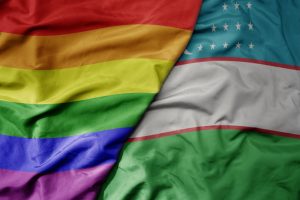August 10 is World LGBTQ+ Tourism Day. The endorsement of Uzbekistan by the U.N.’s tourism agency is concerning given the ongoing criminal prosecution and cruel treatment of members of the LGBTQ+ community in the country.
Uzbekistan has focused on boosting its tourism potential for years, and those efforts culminated in the selection of Uzbekistan to become host of the U.N. World Tourism Organization (UNWTO)’s General Assembly, to be held in Samarkand in October this year. In early July, UNWTO Secretary-General Zurab Pololikashvili met with President Shavkat Mirziyoyev in Uzbekistan. According to media reports, Pololikashvli “warmly greeted” Mirziyoyev and congratulated him on his recent electoral victory. But the UNESCO World Heritage sites, ancient crafts, and stunning natural landscapes promoted by the Uzbek authorities contrast starkly with the practices of imprisoning men because of their consensual sexual relations with other men.
Uzbekistan continues to persecute and prosecute gay and bisexual men: sex between men is illegal, and can land a man in prison for up to three years under Article 120 of the Criminal Code, which punishes “male sodomy.” This legislation also applies to trans women, as their gender is not recognized in Uzbekistan. It is not known how many people are currently behind bars for violating Article 120, but in early 2021, the local media outlet Hook sent a request to the Supreme Court of Uzbekistan asking it to disclose the number of people who have been imprisoned under Article 120 since the country’s independence in 1991. The court refused, stating that this information would have a “negative psychological impact on public consciousness,” “deform national self-consciousness,” “tear society away from historical and national customs and traditions,” and prevent the authorities from “preserving and developing the spiritual potential” of Uzbeks. However, later the same year the Ministry of Internal Affairs published official numbers, stating that 44 men had been punished under Article 120 between 2016 to 2020. Since then, no new numbers have been made public.
Extortion, Abuse and Threats
In addition to risking imprisonment because of their sexual orientation, members of the LGBTQ+ community in Uzbekistan face ongoing pressure. It is not uncommon for law enforcement officials to use threats and extortion against homosexuals, pressuring them to pay significant bribes in order to avoid having their sexuality disclosed to their families, mahallahs (local communities), and social circles, which could have serious, potentially life-threatening consequences. In other cases, law enforcement officials use threats and intimidation to extract information that can help them identify and persecute other homosexuals.
Homophobia is so widespread in Uzbekistan that there have even been cases in which families of outed members of the LGBTQ+ community have locked them up, taken away their passports, beaten them brutally, and forced them to see religious leaders or therapists for conversion therapy, according to research carried out by International Partnership for Human Rights (IPHR) and its partners, the Association for Human Rights in Central Asia, and the Eurasian Coalition on Health, Rights, Gender, and Sexual Diversity.
HIV Treatment Also Incurs a Risk of Criminal Liability
It is also of serious concern that HIV testing and treatment facilities are pressured to disclose information about HIV positive patients to the police. Singled out as a risk group, LGBTQ+ individuals therefore often forgo testing and treatment for HIV, out of fear of being prosecuted for homosexuality.
Despite this obvious incentive to repeal Article 120 of the Criminal Code, in order to control and contain HIV infections in Uzbekistan, and to protect the health of its people, the authorities turn a blind eye to the facts. When asked about this issue, Uzbekistan’s authorities provided a truly counterintuitive response to the U.N.’s Committee on Economic, Social, and Cultural Rights, stating that “the decriminalization of homosexuality has not been considered owing to the pressing need to combat the spread of HIV.” Uzbekistani lawmakers have also used appalling arguments in favor of retaining Article 120 of the Criminal Code. For instance, Rasul Kusherbayev, a member of Uzbekistan’s parliament, stated that LGBTQ+ rights would “damage the development of Uzbekistan and lead to the degradation of its gene pool.”
UNWTO Endorses Homophobic Regimes
Uzbek authorities have been spinning UNWTO’s decision to hold its General Assembly in Samarkand through state-aligned media by claiming that the city has been designated “the World Tourism Capital of 2023.” In reality, UNWTO does not appoint “World Tourism Capitals,” and Samarkand is nothing more than the host city of the UNWTO General Assembly. UNWTO does, however, appoint hosts for World Tourism Day every year. As the next host of the annual World Tourism Day, UNWTO has chosen Saudi Arabia – a country which is known to execute homosexuals.
As the Uzbek authorities are actively using the decision to hold the UNWTO General Assembly in Samarkand to promote the country’s image as a hospitable nation, travelers should pay attention to Uzbekistan’s serious violations of the rights of the LGBTQ+ community in the country.
The International Gay & Lesbian Travel Association, itself an affiliate member organization of UNWTO, states on its website that, “Some LGBTQ+ and allied individuals choose to avoid visiting destinations of this type because they prefer that the economic activity of their visit go towards a country with more favorable laws.”
UNWTO should consider the consequences of endorsing Uzbekistan as the host for its upcoming General Assembly, refrain from supporting this and other repressive regimes that persecute LGBTQ+ individuals and actively engage in advocacy for decriminalization of homosexuality in Uzbekistan. Uzbekistan will not qualify as a world class tourist destination until everyone can visit the country without facing the risk of being targeted by police and locked up simply because of their suspected sexual orientation.

































